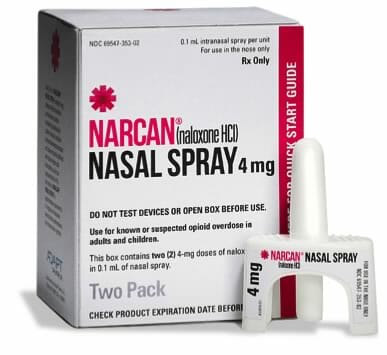Search by category, archive or keyword

The United States has laws in place to protect individuals who render aid to those in distress. Narcan is a prescription drug, though not a controlled substance, that can reverse the effects of a heroin overdose. However, many are reluctant to provide such aid without knowing their legal standing.
Unfortunately, there is no single answer for the entirety of the United States. Laws vary from state to state and sometimes even from municipality to municipality. Further complicating matters, law enforcement can be more or less obliging on the subject, depending on the local jurisdiction.
What Is Narcan?
Narcan is the brand name for the drug Naloxone which, among other uses, counters opioid overdoses. One can administer Narcan in a number of ways, often in the form of a spray for the nose.
 The Food and Drug Administration approved the drug in 1971, but it is assuming an important role in recent years due to the opioid addiction crisis in the United States.
The Food and Drug Administration approved the drug in 1971, but it is assuming an important role in recent years due to the opioid addiction crisis in the United States.
It is a drug, not a controlled substance, so there is no issue of abuse.
Laws vary from state to state regarding the use of Narcan. In some states, it is a prescription drug, while in others, one can purchase it over the counter from a pharmacy or even get it from the local health department.
Every state has passed protection for medical personnel with Narcan training for prescribing and administering Narcan. While cases of people suing doctors over Narcan were extremely rare, the perception by doctors that it was a real danger prevented many from prescribing the drug.
Now that they have protection, access is increasing. By 2014, the application of Narcan had reversed 26,000 cases of overdose.
Friends And Family
It is not enough to ease only doctors’ concerns about Narcan administration. Friends and family are usually in the best position to administer the rescue drug in case of an overdose.
The laws on Narcan are not, however, uniform across the country. Whether or not you are legally liable for administering Narcan to someone who has overdosed on heroin depends on the laws of your state, maybe even the laws of your city, and sometimes, unfortunately, on the whims of the officials in the legal system.
Similarity To Duty To Rescue Law
Duty to Rescue Laws cover similar territory and are often confusing to laypersons.
A Duty to Rescue Law requires people to render reasonable aid to a person in distress or one who someone believes to be in distress. If they do not render this aid, the law can hold them liable.
A Good Samaritan Law provides protection for people who give reasonable aid to injured persons, those in danger, and the ill or otherwise incapacitated.
This means that the person they rescue cannot hold them liable if, in the act of helping the distressed party, they somehow injure the person they are rescuing.
The purpose of the law is so that bystanders will not hesitate to assist if someone needs their help.
How Does This Law Work?
The law allows non-professional rescuers to render aid to those in need of assistance without fearing liability if something goes wrong, provided the situation meets certain conditions.
Those conditions will vary from jurisdiction to jurisdiction, but the laws share some general features. These include:
- Imminent peril. Some laws require there to be imminent peril in order for the rescuer to be immune from liability. If someone is injured but not in immediate danger, a rescuer may still act to help him or her. This depends on the provisions of that state’s particular law, they may face liability for damage and recklessness.
- Compensation. The law only covers aid rendered without the intention of financial reward. It does not cover medical professionals when performing first aid, for example. Some laws, however, do cover medical professionals when they are acting in a volunteer capacity.
- Obligation to remain. A rescuer may not leave the party in distress until another rescuer of equal or better ability takes over or until giving aid becomes unsafe. The law never forces a rescuer to take risks to aid someone.
- Consent. The rescuer needs the consent of the party in distress. However, implied consent applies if it is a minor with no legal guardian present, if the person is unconscious or too intoxicated to be coherent or if the person is in some way mentally unfit to make decisions.
What About Drug Laws?
The law does not cover every aspect of administering Narcan. Because of the prohibition of heroin use, you can still run afoul of drug laws, even if you have protection from liability when administering Narcan. Though most states have enacted laws to protect anyone who calls 911 to report an overdose, nine states have not:
- Arizona
- Iowa
- Idaho
- Kansas
- Maine
- Missouri
- Oklahoma
- Texas
- Wyoming
Furthermore, even though states have passed laws protecting 911 callers, this does not mean that the police are in agreement with the law.
Depending on the jurisdiction you are in, if you call 911 to report an overdose while partaking in the drug, the cops can still look for other ways to charge you with something.
There are enough laws on the books that they can often find some way in which the 911 caller was not in compliance.
The heroin epidemic claims the lives of tens of thousands of Americans every year.
Narcan is an effective medication that reverses an overdose and has already saved the lives of many thousands, according to reports. However, there are still legal issues regarding the topic, and there is no single answer to these questions for everyone in the United States.
Medically, the best thing to do in case of an overdose is to administer Narcan and call 911.
However, certain laws may make some people hesitant to do this.
It is important to know the laws of your state, of your city, and even the disposition of the local police and district attorney. This way, you know what you are getting into if you find yourself in that situation.
An intervention is not about how to control the substance user; it is about how to let go of believing you can.
“The most formidable challenge we professionals face is families not accepting our suggested solutions. Rather, they only hear us challenging theirs. Interventions are as much about families letting go of old ideas as they are about being open to new ones. Before a family can do something about the problem, they must stop allowing the problem to persist. These same thoughts and principles apply to your loved one in need of help.”
Mike Loverde, MHS, CIP
